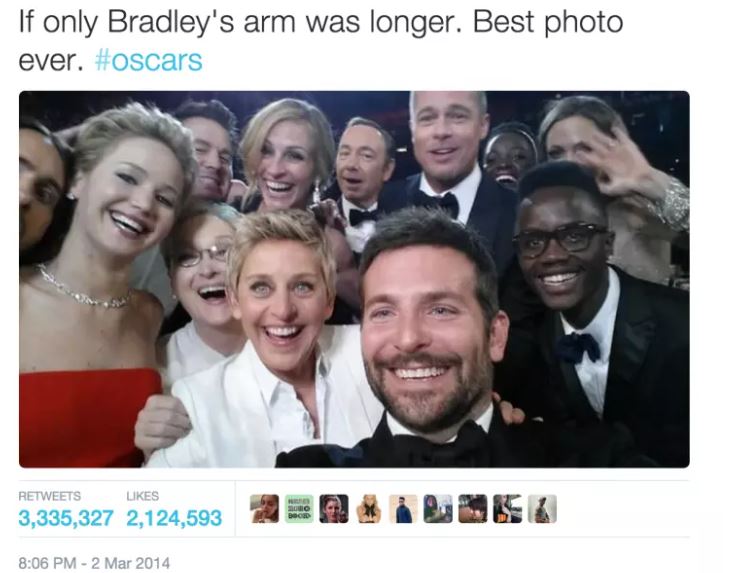Bitcoin
Bitcoin is revolutionary, but will your favourite Hollywood celebrity promote it?

No organization or startup or individual, presently in the business of products and services, requires an introductory class in the power of advertisements. Let me give you a powerful example.

Source: searchenginejournal.com
If you are a pop-culture fan like me and you haven’t lived under a rock for the past decade, you would remember this iconic selfie that broke the Internet back in 2014. For the ones who don’t, let me jog your memory!
Back in Oscars 2014, Ellen DeGeneres, host of The Ellen Show, took this selfie with the likes of Bradley Cooper, Brad Pitt, Meryl Streep, Jennifer Lawrence, Jared Leto, Julia Roberts, Angelina Jolie, Channing Tatum, Lupita Nyong’o and He Who Must Not Be Named (As is always the case, Meryl Streep was great here, despite the fact that one cannot see her entire face).
However, what you don’t know is that Ellen used a Samsung Galaxy Note to take this star-studded snap. Samsung was a sponsor of the Oscars that year, but the picture was completely unplanned. In just a couple of days, this particular photo was retweeted by 3.3 million people, with Samsung later revealing that the image was worth between $800 million to $1 billion in business! Powerful, eh?
Now the question to ask (since I should be talking about crypto) is, why haven’t these A-listers starting promoting our beloved Bitcoin or any other crypto-asset? And what will happen if one day they do?
The era of celebrity endorsements and its evolution
Source: Slideshare
Since the first television commercials in 1941 for Bulova watches, (FYI, it cost $9 to make that ad), endorsements have evolved drastically over the years. However, we will be not be going back in time like Bill Murray; instead, we’ll focus only on the last decade since that is when cryptocurrencies came into existence.
Over the past 10 years, advertisements and endorsements have largely been based on online platforms or what we call ‘Social Media.’ Television commercials are still relevant no doubt, but ads on Youtube, Facebook, and Instagram reach a wider and more impressional audience. However, as the aforementioned example illustrates, the inclusion of celebrities and high profile personalities is still key.
Therefore, it really is an enticing opportunity for the crypto-industry a host of Hollywood darlings or sports personalities (I mean Cristiano Ronaldo is the most followed person on Instagram! Hollywood doesn’t have all the sauce!) start promoting the use of crypto-assets. It can have a lot of positive implications for Bitcoin and will promote general crypto-adoption.
However, before day-dreaming about Kylie Jenner sharing a tweet with #BitcoinisBae on Twitter, we need to understand the market these celebrities mostly cater too.
Millennials and Gen-Z; Are they as receptive as they seem?
In order to answer this question, let’s take into consideration an analysis carried out recently by Morning Consult.
The analysis defined Millennials as those who were born between 1980-1995 (aged 25-40) and Generation Z as those who were born between 1995-2020 (aged between 5-24).
The research was conducted solely based on the engagement of the two generations on social media platforms, so TV commercials data would not be considered here.
Now, the study suggested that 72% of Gen Zers and Millennials followed an influencer or celebrity, while 23% claimed to follow “many,” while 49% claimed to just follow “some.”
Further, the report found that 88% of Gen Zers and Millennials discovered products they were interested in buying through social media, while a significant 55% purchased a product after seeing their favorite celebrity or influencer share a post about it.
In terms of platform popularity, YouTube is the evergreen platform among every age group. Instagram was used by 83 percent of the people aged between 17-21 and Facebook was the most popular with 22 to 38-year-olds.
In short, a market for promotion is definitely there, and all is not just fairy dust.
However, the report also said,
“Gen Z and Millennials tend to trust family and friends recommendations and product reviews more than celebrity endorsements or brand representatives.”
Simply put, family first (Something the Lannisters would approve, right?).
Pros and Cons of promoting crypto (for your A-listers)
Before we begin to assess how beneficial or undesirable it would be for famous celebs, let’s quickly wrap up how it will be good for crypto.
There is only one answer – Crazy adoption! Consider this – Bitcoin, at the time of writing, had roughly 30 million non-zero addresses. If tomorrow, Dwayne ‘The Rock’ Johnson goes on Instagram and tells his 180 million followers to try out a Bitcoin wallet, at least half of them might probably consider doing it!
If 10 percent of his total followers become active users and start utilizing crypto, that is an additional 18 million addresses in one shot, and that is only one celebrity promotion.
a) Minor pros
Now, let us consider the benefits these popular individuals would receive if they promote crypto-assets. Over the top of my head, there are none! I mean, there have been certain ICO projects and coins in the past that paid famous personalities (Floyd Mayweather got paid $100,000 to promote an ICO, and it didn’t go well with the SEC), but for top dogs such as Bitcoin, Ethereum, and XRP, you wouldn’t get an Amazon gift card to promote such crypto-assets.
Therefore, the promotion bit from the celebrities’ end would have to be selfless and not out of self-interest. The likes of Lionel Messi, Robert Downey Jr., and Lebron James, if they promote Bitcoin tomorrow, would have to do it for the greater good of the future’s financial and economic structure, rather than adding few more zeroes in the bank accounts.
Promoting a cause not out of self-interest. Have you heard of any celebrity doing that lately? No? Yeah, me neither.
b) Major cons
Source: ft.com
Now, coming to the cons, you will understand how the arguments against such endorsements completely tip the scale.
For starters, let’s go back to the Mayweather case. The legendary boxer along with music producer DJ Khaled was fined a combined $767,500 by the Securities and Exchange Commission for promoting an ICO named Centra Tech.
Without going into too many details, it was clear that regulators and lawmakers took investments in and promotion of crypto-assets seriously, with the SEC not hesitant to pursue legal action against such promotions.
Now, an argument can be made that Bitcoin and Centra Tech whatever, are definitely not at the same level but, they are playing the same field.
Other than serious and expensive legal repercussions, famous celebrities may also face the threat of tarnished reputations.
Imagine this – What if tomorrow, Selena Gomez promotes Ethereum, one of the most respected crypto-assets in the space? A fan entering the crypto-space after her promotion may end up buying some other digital token (there are over 5000 of them!) as well. Now, if that particular person loses money investing in some other shady token, human psychology dictates that people tend to blame others for their own mistakes.
Then there’s the case of crypto itself. Despite the entry of institutional investors and a more cordial and objective coverage by mainstream media, in many quarters, the cryptocurrency industry continues to operate under the pall of the Silk Road. Would celebrities risk being associated with something that has such a troubled history? Not really.
Hence, celebrities and their PR teams would be smart enough to not indulge in such promotions which can eventually de-value their own face value and contribute to them losing fans. In the age of social media, it takes only one public blunder to become a meme at best, and a fraud at worst. Just ask Michael Jordan!
Predictable Conclusion
Ergo, what can we conclude? Well, in the near future, the likes of Bitcoin are definitely not sliding into popular celebrities’ DMs or posts because the red flags are too evident and too risky at the moment. For the greater good of the economic and financial system, I don’t reckon these famous icons would bet their life’s hard work and popularity for some form of Internet money.

